TL;DR:
Because there are zombies on inhabited islands, too, but getting to an island is incredibly dangerous in itself. You're subjecting yourself to additional risks in order to reach a destination where you'll face the same problems people on the mainland are struggling with.
Update: Fear the Walking Dead:
In the second season of the spinoff series, Fear the Walking Dead, the protagonists - two families from Los Angeles and a shady rich guy with a luxury yacht - attempt to do exactly what you suggest in your question. It doesn't go well, for some of the very reasons I already mentioned (see below), as well as some I didn't:
- Almost as soon as the protagonists' yacht weighed anchor, they were confronted with helpless and hopeless survivors adrift in flimsy rafts and dinghies, begging for help, and however much they wanted to help these poor people, the heroes had to make the difficult decision to leave them behind to die. Bringing them on board the yacht would compromise their own safety and diminish their limited resources.
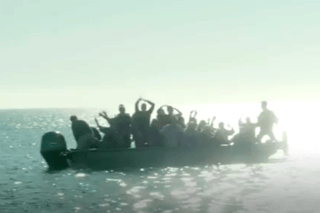
- Food supplies are already a problem, and the fishing isn't good, so the one big meal we've seen them share was a nasty looking eel.
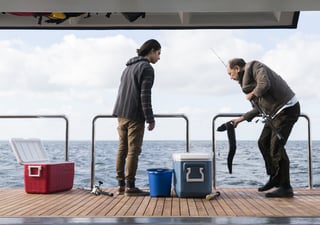
- Within a day or two of setting out to sea, the yacht encountered a debris field from a "pirate" attack on other ships. The "pirates" soon attacked the yacht as well, and the protagonists barely made it out of the situation alive.
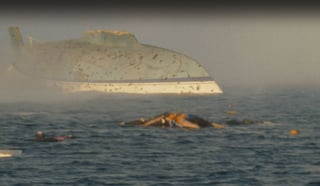
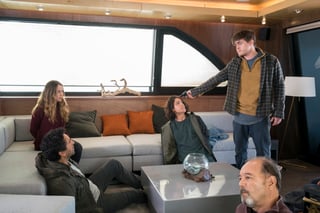
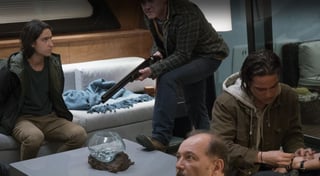
- They found one apparently idyllic, fairly small - but survivable - island; it was full of zombies, and the fenced compound housing the last family of human survivors ran into trouble when the daughter died, reanimated, and killed her mother.
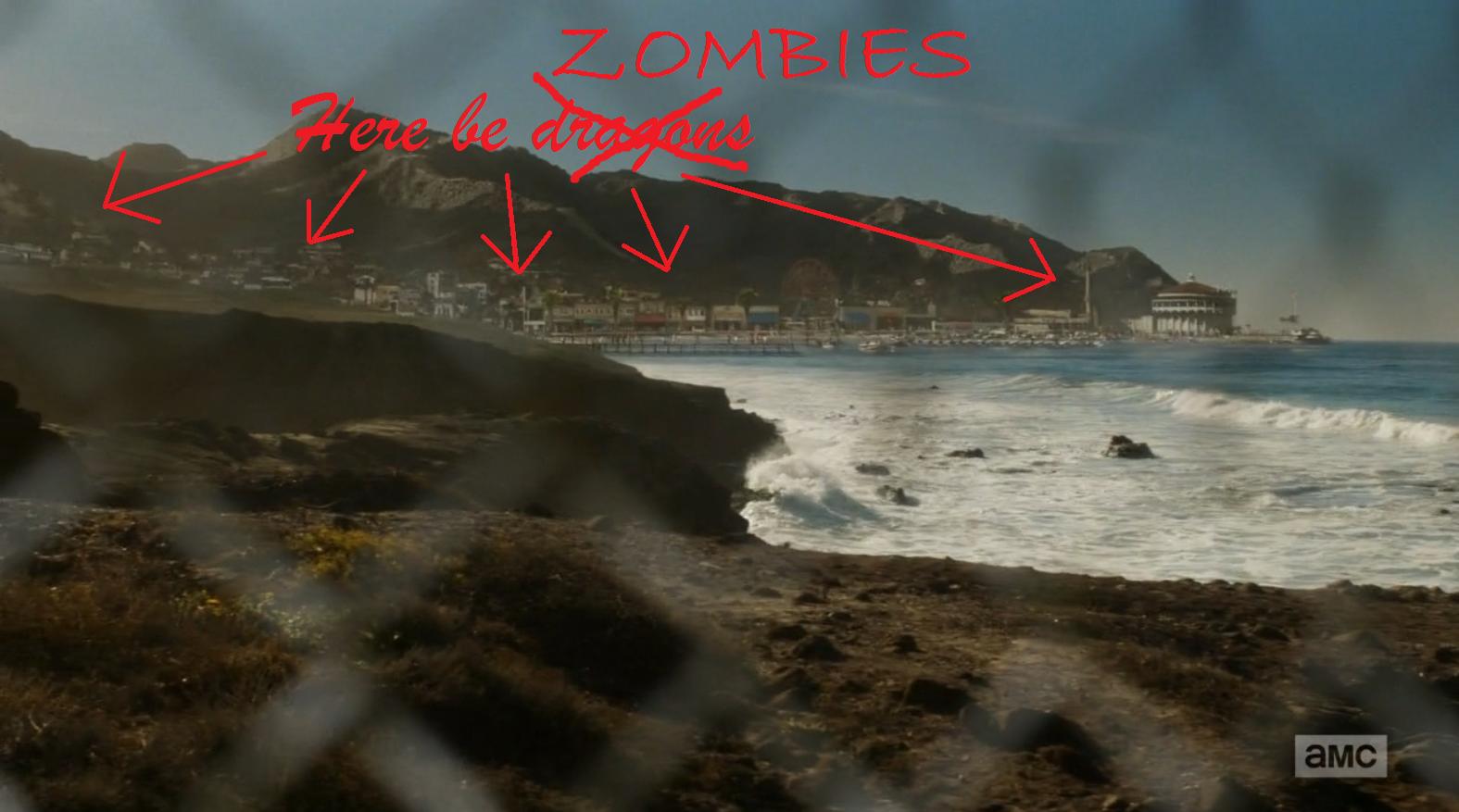
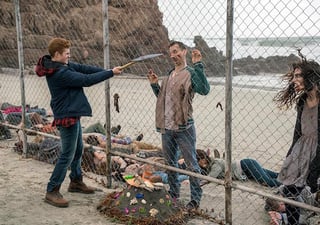

- The possibility of fleeing to Hawaii is vetoed as soon as it is brought up, because L.A. is 2,500 miles from Hawaii, the trip would be extremely dangerous, and there is no reason to believe that Hawaii is any safer than the mainland. The conversation happens after Alicia responds to a CB transmission by a man named Jack and begins talking to him:
Alicia: Where you gonna go?
Jack: I don't know. We thought maybe like Hawaii. That's far. And it's Hawaii, right? It's like coconuts in paradise.
Alicia: Paradise?
Jack: No one's gonna turn there. In paradise? - (laughs) But it's too far, too far for this boat.
Alicia: Well, do you guys have water?
Jack: Yeah, we have some. We've got little pans out hoping it rains, catch something. 'Cause if not, we'll be drinking our own pee soon.
- Fear the Walking Dead, S2E1, Monster
Among the more reasonable destinations - i.e., up and down the west coast of North America - there doesn't seem to be any place to go that is both significantly safer than where they started out and capable of sustaining a group of survivors for any length of time.
First attempt at landing after the island:
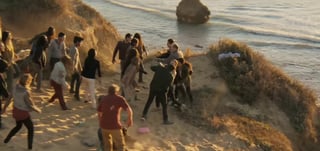
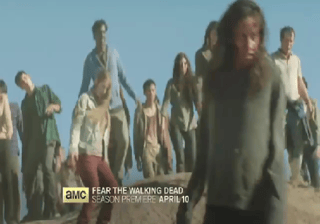
On the island, the head of the last surviving family - George - tells Travis that the western United States has fallen:
George: You folks are from Los Angeles. You got that air about you.
Travis: We left when they started bombing.
George: Napalm. It's what they're using up and down the coast. I've been checking in with some of the other ranger stations.
Travis: It's in every city?
George: As far as I can tell. Portland, Seattle, Vancouver.
Travis: And south?
George: San Diego was burned.
Travis: (sighs) Further south?
George: They shut down the border. No way in or out.
Travis: Oh, God. So what's left?
George: Not a hell of a lot. Interior is no better than the coast. Last time I connected to Joshua Tree, ranger said Petrified Forest, gone. JT shut down soon after. That's Cali, that's Arizona. Zion went dark before them. Utah gone. Rocky Mountain station is dead. That's Colorado. That's the Continental Divide. That's a good goddamn half the country.
- Fear the Walking Dead, S2E2, We All Fall Down
- There have been a surprising number of floating zombies.
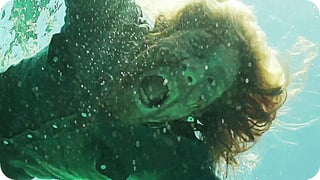
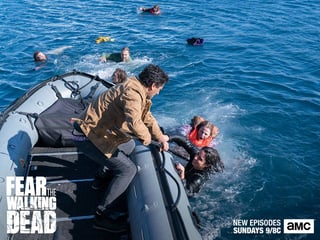
- And every beach we've seen so far is inundated with a steady flow of zombies washing up on shore.
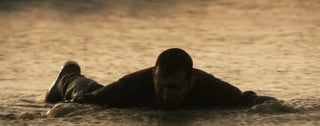
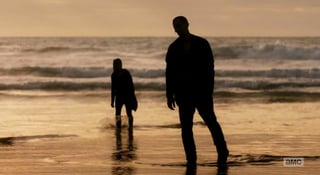
- Even under normal (i.e., non-apocalypse) conditions, sailors get into trouble so often that the Coast Guard has to save many of them on a daily basis. That's no longer an option:
Man on Radio: This is Coast Guard Station LALB. We have no assistance to provide. I repeat, there is no rescue by sea, land or by air. There's nothing. Forgive us.
- Fear the Walking Dead, S2E1, Monster
As one of the main characters - Travis - says:
“It's no safer on sea than on land.”
- Fear the Walking Dead, S2E2, We All Fall Down
Word of God:
Dave Erickson:
Fear the Walking Dead Showrunner Dave Erickson addressed this point in interviews prior to Season Two:
Q: Is there anything else that you’d like to share with fans about the upcoming season?
A: I think the most intriguing question is this: We all know that we’re going to be on a boat because we saw that at the end of season one but... where are the characters going to go?
I think we’ll quickly realise that the ocean is no safer than land and that there’s a very different level of adversity and threat on the water. It forces the characters to set their sights on a destination. But where will that be? North to Vancouver or south to Cabo? This is a boat that has a really incredible range and a full tank of gas so, feasibly, they could head out across the Pacific for 4 828km or more and make it to Hawaii. We could even end up doing zombies in paradise! [Laughs].
That’s the intriguing question for the first few episodes of the new season: what harbor can the characters find and when they get there, will it be safe or not?
- Source
And:
First of all, getting to the yacht is going to be something of a challenge. And then the question becomes: Once we get to it, which way is it going to go? And we will discover that we were not the only ones with this bright idea. There are a lot of boats up and down the coastline of Southern California. So it will become very interesting when we get to see and discover that we’re not the only vessels out there, and there may be others that are covetous of what we have, which will have certain features that will be enviable to people that are trying to escape the zombie hordes.
- Source
And:
Q. Season 1 of FTWD was well received by fans. What can they expect in season 2? Will there be a time jump?
A. Season 2 is going to pick up on the heels of season 1. So we have established that bit on Strand's yacht – the Abigail. One of the things that we have to determine in the first two episodes is where exactly are we going to go. We are now trapped on a boat in the middle of the ocean, being led by a man whom we don't really know.
We have to find a destination; we have to find a home. The wonderful thing about Abigail is that, she has a lot of stuff that allows them to stay afloat for quite some time. But the other thing they learned very quickly is that we are not the only people who will have the great idea to take to the open waters.
There will be as much activity and as much danger on the sea as there were on land... They will be in a desperate position to try to find a safe harbour.
...We will learn quickly that zombies do not swim, but there will be some infected action on the water, that is something we actually experimented with in the first couple of episodes and learnt quickly.
- Source
And:
There’s nothing more scary than being stuck in the middle of the ocean with no land in sight and this abyss beneath you. I think that in and of itself creates a degree of uneasiness, then if you add to that the fact that you’re trapped on this vessel with some people whom you don’t know and whose agendas you don’t know, I think it lends itself to dramatic tension.
- Source
And:
But it’s really an exploration of, we are on the boat, we know LA is not safe, and we are desperately trying to find out, “Where do we go and how do we piece together this information?” There’s a certain, there’s a mystery quality, but there’s this sense of, “We know LA is gone, we’ve heard some reports from other places, but it can’t be everywhere.” And very quickly we realize we weren’t the only ones with the bright idea to go to sea. It’s not safe on the water, maybe we have to go to land. It’s not safe on land. So what you’ll see over the next few episodes is them sort of starting to piece together better what’s the tapestry of the destruction is and what it is and how far it’s gone.
- Source
And:
I think there’s something, for me personally, being stuck in the middle of the ocean with no land in sight is incredibly upsetting and isolating.
The idea for me was creating that sort of defcon sense of fear and anxiety. And especially in a situation where you are not certain of the people on the boat with you, you come to realize there are potential threats from other people on the water, you know you can’t go back home again, and it lends itself to an aspiration as to where we are going to go and where is safe? Strangely, by disconnecting ourselves from land I think it amps that up in an interesting way.
- Source
And:
There’s thousands of boats through L.A. County. So a lot of people will stock up the boats and try to get to the water and avoid land as much as humanly possible. [But] if you look at Strand’s yacht, it’s a pretty handsome vessel. It’s something that you can survive on for a good period of time and that’s something others might covet. So when you get to the question of what’s worse, walker or human, we’ll continue that theme. There will be quite a bit of action on the sea.
- Source
And:
[The survivors' decision to abandon the sea and return to land] could be sooner than you think. We will be on the boat for a considerable amount of time. A lot of our action will take place on the boat but because we're not alone on the water, because there are threats at sea as well, we're going to be forced to go back. It won't be every episode. It's not going to be a new port of call every episode, but we'll go to land sooner rather than later.
- Source
Gale Anne Hurd:
Executive Producer on both shows, Gale Anne Hurd, agrees:
Many, many fans of 'The Walking Dead' said that they had the solution to the zombie apocalypse. They'd take a boat and go to sea. Well, you know what? They're going to find out whether that was really the answer or not. I think some of what they'll see will surprise them.
- Source
And:
With Fear The Walking Dead Season 2 we are still following the rules of the Kirkman-created universe, so we won’t violate those and there is no crossover. On the other hand, we are now out to sea on the show and we are going to encounter the kind of threats that you certainly wouldn’t encounter if you were landlocked in Georgia or the greater Washington D.C. area.
- Source
Robert Kirkman:
Creator of The Walking Dead, writer of the TWD comic books, and Executive Producer on both shows, Robert Kirkman, confirms this:
When you see Fear the Walking Dead [Season 2] you’ll probably stop asking why they didn’t just go to the water. You’ll start asking, why won’t they leave the water? Very dangerous.
- Source
Original answer - Escaping the inevitable zombie apocalypse at sea is a very bad idea:
This question can't be answered by reference to the original The Walking Dead comic books and television series, where it has never come up, but Max Brooks' books - World War Z and The Zombie Survival Guide - address it, although perhaps indirectly.
The biggest problem with any sure fire plan for dealing with The Inevitable Zombie Apocalypse is quite simple: Whatever your plan is, it is also the plan of thousands, or even tens or hundreds of thousands, of other people.
Everyone would react the initial outbreak by running to their nearest gun and ammo shop and buying everything in sight, and the stores would be empty within a few days, or even hours.
Next, everyone would try to get to whatever place they imagine to be the perfect spot to survive the apocalypse. When they arrive, they will find that thousands of other people are already there, and there is no room at the inn. Even if they manage to cram themselves inside, the overcrowding will soon make it obvious that the place is untenable, and there is absolutely no chance of surviving there. Access to food, water, shelter, sanitation facilities, etc, will become a serious problem very quickly.
As your question reveals, many people will be thinking "I know - I'll find a boat and sail out to an uninhabited island somewhere. It's foolproof!"
The first few people who try this approach might have some success, but soon, all the boats will be gone, and the few people lucky enough to obtain one will have no idea how to use it properly. Sailing is dangerous, and even the most experienced sailors frequently go out to sea and are never seen again, even under the best possible circumstances (e.g., The Inevitable Zombie Apocalypse hasn't happened yet).
An inexperienced amateur trying to sail alone for the first time in his life doesn't have very good chances of survival at sea. Jumping into a boat with little or no experience and setting out to sea is only slightly less foolish than hopping into an airplane and trying to fly somewhere with little or no experience. And even if you manage to find an island and reach it safely, you will probably discover a few unpleasant realities:
The island is already full to capacity. If he gets ashore and settles in, the same problems that plagued the would-be survivors on the mainland will be even worse here: no food, no drinking water, no sanitation facilities, no medicine, no shelter, etc. Within weeks, the island will probably be stripped of vegetation and exposed to the elements.
Small islands are not a great place to live if you don't have access to the things most of us consider essential for life, and which we take for granted in the pre-apocalyptic world. Consider the risks posed by hurricanes, for instance. The national weather service is gone, so you have no way of knowing when a serious storm will happen.
Even if you find an island that no one else has claimed, you should think about why no one else has claimed it. The most likely explanation is that the island is not simply uninhabited, but is also uninhabitable. Unless you can make food and water magically appear, you're in trouble.
Since we're talking about TWD, we can assume that the "rules" are the same as in TWD. In other words, anyone who dies becomes another zombie. Thus, if you've found a nice place to weather the storm, you are still in danger.
Again, we're talking about TWD, where there are bad guys and marauders all over the place, and they'd rather kill you and take your stuff than scavenge everything they need peacefully. At sea, this is still true, except the bad guys are called "pirates" rather than "marauders".
Max Brooks describes another problem with the island idea: zombies don't drown, and although it would slow them down quite a bit, they are entirely capable of walking around on the ocean floor. Everyone who had the idea of survival at sea is now, quite predictably, at sea. As they die of hunger, thirst, violence, zombie attacks, disease, or whatever else, they are either thrown overboard or fall overboard on their own. This means that there are now hundreds of thousands (perhaps even millions) of zombies wandering around underwater, and they will probably make their way onto every island and coast eventually.
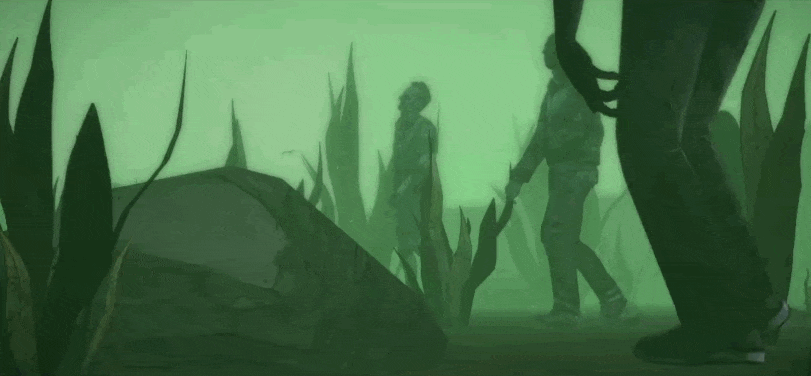
Zombies strolling along the sea floor in Telltale Games' The Walking Dead: Michonne special
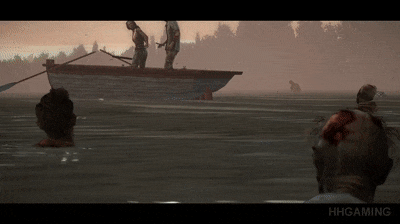
And eventually emerging onto land
And although it might seem unlikely, the threat of a derelict ship running aground on your island is very real. Imagine a huge cruise ship or cargo vessel carrying thousands of people out to sea. An outbreak occurs, and the ship is overrun by zombies. It is now a zombie cruise liner, and no one is steering the ship. It runs aground on the shore of your safe haven, and soon enough, the zombies notice your presence. A deluge of undead pours from the deck onto the beach, and you and whoever is with you are forced to fight them off as best you can. It is a hopeless fight, and within minutes, you've all been bitten. Game over.
However, the most likely outcome is less dramatic. You'll probably just hang on for as long as you can, and eventually, you'll run out of the essentials of life: food, water, shelter, fuel (i.e, firewood), medicine, etc.
You will also be faced with the dilemma of being trapped in what you previously thought was an ideal sanctuary. You'll either run out of gas for your boat, or the gas you have will deteriorate and become useless. The boat will need maintenance, but you won't have access to the materials and tools that are necessary to perform maintenance. Anyone who owns a boat can tell you how much work goes into keeping it in working order - we're talking about thousands of dollars each year.
This work almost always involves putting the boat in dry dock (i.e., hoisting it out of the water and suspending it from a crane), and you don't have the resources necessary to do this. Sails and rigging rot when exposed to salty air and seawater. Wooden hulls rot and are eaten away by parasites and weird little sea creatures. Fiberglass hulls can easily be punctured. Masts break and deteriorate over time, especially when exposed to the elements. Barnacles need to be scraped off. Fresh paint must be applied at least on an annual basis. Boat engines require a specific mixture of oil and gas to function properly. Engines need batteries and spare parts. Repairing and maintaining engines requires both parts and expertise. After a surprisingly brief period of time, your boat will be nothing more than a rotting hulk stranded on the shoreline.
Compare this situation to that of a survivor (or group of survivors) on the mainland:
If you've depleted the resources in your area, you can simply move on to the next place. Whereas relocating at sea requires a seagoing vessel, relocating on land requires nothing more than your feet.
If someone in your party gets sick, you can search the area and (hopefully) find what you need. At sea, this option is either not possible or is far more complicated, difficult, and dangerous.
If your safe haven is discovered by bad guys, you can either fight to keep it or run away. Again, at sea, this is either not possible or incredibly difficult, complicated, and dangerous.
If your current location is not ideal, you can simply wander around until you find something better. At sea, the voyage will be perilous, and something as simple as a minor storm might be the death of you; on land, the journey poses serious challenges and risks, but they are far more manageable. You have more options open to you on land.
If a storm hits, you can probably find decent shelter, and you probably won't have to deal with storm surges, massive waves, etc. On a small island, a storm surge will almost certainly kill you. Even without the storm surge, waves may erode the shoreline and drastically reduce the habitable zone of the island, if they don't destroy it entirely. If your island used to have plant life that provided food, the saltwater might kill it all and leave you with no more food. If your island used to contain a source of fresh water, the inundation of saltwater might render it useless to you. Now you have days to live, and your boat was probably washed out to sea by the waves. On land, if your source of fresh water is compromised or removed, you can just find a new one.
If you are on land, there are stores, warehouses, houses, hospitals, etc, all over the place. We are terrestrial mammals, so we usually keep our nice stuff on land. If your island initially had nonnative resources (e.g., stores, houses, etc), it is almost certain that many, many people will have gone there for precisely that reason, and whatever useful materials were there will soon be gone. Even at the beginning, it is likely that the resources were already very limited.
I could go on like this forever, but I think I've made my point. No matter how appealing the idea of finding an island and hunkering down might seem, it is almost certainly a worse option than trying to survive on land.
Conclusion:
TWD franchise creator, comic book and television writer, and Executive Producer on both shows, Robert Kirkman says:
When you see Fear the Walking Dead [Season 2] you’ll probably stop asking why they didn’t just go to the water. You’ll start asking, why won’t they leave the water?
- Entertainment Weekly interview
FTWD protagonist Travis Manawa says:
It's no safer on sea than on land.
Fear the Walking Dead, S2E2, We All Fall Down
The Season Two tagline says:
NO SAFE HARBOR
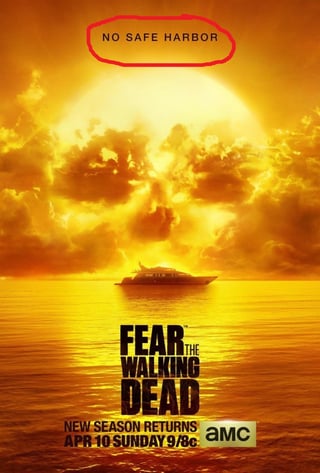
And they're all right.
Trying to escape zombies by fleeing to an island doesn't mean you'll survive - it only means you'll die (sooner than later, most likely) somewhere that isn't the mainland.


















